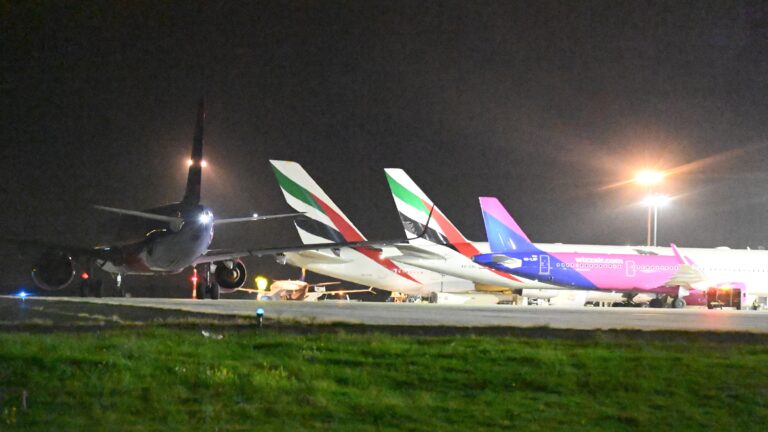Last week, when István Nagy, the Hungarian Minister of Agriculture departed for Lviv, he posted only one sentence on social media: ‘Leaving for Ukraine, because the world needs grain.’ To be fair, the seriousness of the situation unfolding before our eyes does indeed warrant such a dramatic tone, since it is quite possible that we are facing the greatest humanitarian catastrophe in recent history. The reasons behind this crisis are quite complex, but I will attempt to unpack them nonetheless, before looking at the purpose of the Hungarian visit and its possible outcomes.
Global Crisis Underway
Just days before the Russian invasion of Ukraine on 24 February, David Beasley, Director of the UN’s World Food Program warned about an increasingly dire situation primarily in the Middle East and Africa, saying that if it goes unaddressed, then the next nine months will see the rise of catastrophic famines, leading to the destabilization of nations, an upsurge in conflicts and wars, as well as unprecedented levels of mass migration. The food crisis in the Middle East and Africa was triggered by various factors, such as extreme weather conditions and supply chain disruptions during the COVID-pandemic. However, what Beasley did not know at that time was that the war would make a bad situation infinitely worse very soon.
Historically, both Ukraine and Russia have been among the world’s most significant agricultural powerhouses. Prior to 2022, Ukraine belonged to the top five wheat, barley, corn and oilseed exporters in the world, producing roughly nine per cent of the of the global wheat supply alone – feeding more than four hundred million people annually. If we also take Russia into account, the two countries’ combined production reached thirty per cent of all the wheat traded globally. Now, the primary market for Ukraine’s food production was the Middle East as well as North and East African countries – where the harsh climate and poor soil quality leave no other option but to import. The overwhelming majority of Ukrainian crops were usually transported via cargo ships across the Black Sea, the Mediterranean and the Red Sea, to as distant destinations as Ethiopia, Eritrea and Yemen. Most countries in these regions are severely dependent on Ukrainian and Russian wheat imports, with the two countries together supplying, for example, over 75 per cent of Sudan’s, 82 per cent of Egypt’s and a hundred per cent of Somalia’s imported wheat under ordinary circumstances. Ordinary, as in before the war.
Ukraine was feeding more than four hundred million people annually
Now, saying that the war in Ukraine has disrupted local wheat production is a massive understatement. One-third of Ukraine’s primary agricultural areas are currently under Russian occupation, while constant shelling has destroyed significant portions of the rest. Furthermore, over two-thirds of Ukraine’s coastline is now directly controlled by Russia, while the remaining ports around Odesa are under Russian naval blockade. What’s more, to prevent Russians from attacking the city from the sea, the Ukrainians have mined the waters around Odesa. The blockade and the mines together make it practically impossible for any large shipment to leave Ukraine for the Middle East or Africa, while using alternative routes by rail, for instance, would be too expensive and simply unfeasible due to the lack of proper infrastructure, at least for now. Although Russia is theoretically still able to transport its crops to the highest bidder, the sanctions have forced Moscow to partially ban its wheat exports, and the shortages have driven up the prices to levels simply unaffordable for the poorest of nations.
Beyond Food: Terrorism, War, Migration
This is also why the leaders of the African Union have repeatedly called for the immediate end of hostilities in Ukraine and the start of peace talks as soon as possible. According to the most recent UN report on food insecurity, in 2021 nearly 400 million people were facing food shortages, 40 million were on the brink of famine and over half a million were already starving. Most of these people live in Middle Eastern and Sub-Saharan countries (especially in the Sahel belt), and as a consequence of the war in Ukraine, their situation could deteriorate rapidly by the end of this year, resulting in an increase of these already catastrophically high numbers.
That will cause massive social and political unrest
That in turn will likely cause massive social and political unrest across the third world–the overturning of governments and the strengthening of terrorist organizations–and could even bring about the eruption of new regional wars. It suffices to look at the situation in Ethiopia, where the country’s northernmost region of Tigray has been fighting a civil war of secession for almost two years, backed by Egypt and Sudan (among others), who wish to control or at least temporarily disrupt the operation of the Great Ethiopian Renaissance Dam. The GERD, in short, is built on the Nile and is the largest of its kind in Africa, which causes concerns for the water security of the countries downstream. For the moment, the conflict has kept its civil nature, but with Egypt’s and Sudan’s already failing crop and livestock production at stake, and without the hope of enough imported wheat reaching their countries, escalation is far from being unimaginable.
The food shortages, social unrests, and rise of conflicts can and likely will trigger the century’s largest migration wave so far towards Europe and other parts of the world. Just in the last six months, Hungary has stopped over a hundred thousand illegal crossing attempts at its Southern border, a number that will only rise in the coming months – meaning millions upon millions of people trying to escape starvation by taking the dangerous journey to Europe.
Is There Any Hope?
At this point, only quick peace in Ukraine can somewhat mitigate the effects of what is coming. With that seemingly beyond reach for the moment (even if talks to lift Odesa’s naval blockade are now underway) the second most important mission for the world is to somehow get the already harvested wheat out of Ukraine. There is an estimated amount of 22 million tons of wheat stuck in Ukraine at present, and if we do not act quickly enough, it will spoil. Of course, that amount is not nearly enough to solve the problem we are facing because of the war, but it would certainly buy us some precious time.
And that is precisely what the Hungarian government and Minister István Nagy set out to do, along with lots of other European officials. According to the minister, the strategy discussed in Lviv is far from being optimal, yet it may be the only option for now: however ineffective the continental transit routes may be, they simply have to be utilized. Right now, the Ukrainian-Hungarian border has a capacity limit of four thousand tonnes of wheat transported by rail, which according to the plans, could be increased up to eight to ten thousand tonnes a day by modernizing the infrastructure, acquiring additional shipping cars and complementing the process with trucks.

PHOTO: KORMANY.HU
Hungary is committed to this effort, yet there is only so much a country of its size can do alone. In order to make it all work, two things are essential: one, we need Ukraine’s other neighbours (such as Poland and Romania) to get aboard and work in close cooperation along their respective borders, and two, we need the whole European Union to act as one in terms of quick funding and organizing the transit routes further inland towards the Mediterranean. In short, what we need is the same type of selfless cooperation the West already proved to be capable of during the 1948 Berlin Airlift. Along with his Ukrainian colleague, Mikola Solski, Minister Nagy announced that they will formally request EU support for this operation, and the results should be visible in the coming weeks. It is not hard to see how Europe as a whole would benefit from this wide infrastructural upgrade in the long run–since Ukraine will inevitably develop closer economic ties with the EU in the future–, but for now, speed is the key factor for the stability of the whole world.
Speed is the key factor
Therefore, for the sake of hundreds of millions in the third world– and, consequently, of all the rest of us–let us hope that this venture succeeds. The next three to six months will be crucial in giving our diplomats a chance to solve the problem of the Black Sea. Because this may be the only chance we get.








